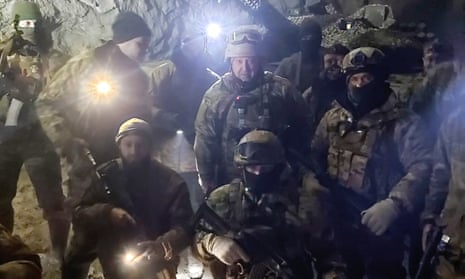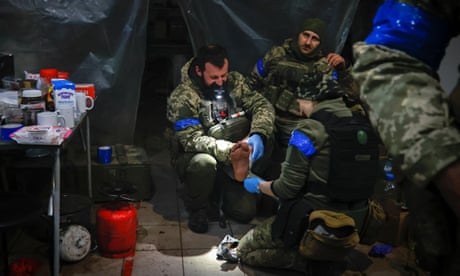Yevgeny Prigozhin poses with some of his mercenaries in Ukrainian town renowned for its salt mines.

Yevgeny Prigozhin released this photograph of himself (centre) surrounded by Wagner fighters, in what appeared to be one of Soledar’s salt mines. Photograph: Telegram
The head of Russia’s Wagner mercenary group has claimed his forces have completed the takeover of the Ukrainian town of Soledar, which if confirmed would mark Moscow’s first major battlefield success since last summer.
“Wagner units have taken the whole territory of Soledar under control,” said Yevgeny Prigozhin in an audio message released on his Telegram channel late on Tuesday.
Prigozhin said on Tuesday Ukrainian troops were surrounded in the centre of the town and “there are street battles ongoing. The number of prisoners taken will be announced tomorrow.”

Denis Pushilin, a Russian proxy official in eastern Ukraine, told Russia’s Channel One that Soledar had been taken. “At the current time, according to the information I have, the centre of Soledar is already under the control of Wagner units,” he said.
Prigozhin released a photograph of himself, surrounded by Wagner fighters, in what appeared to be one of Soledar’s salt mines, possibly a deliberate riposte to US officials who have in recent days publicly claimed the controversial businessman is interested in taking over salt and gypsum mines in the area.
It was not immediately possible to verify the location of the photograph and there was no confirmation forthcoming from Ukrainian officials of Prigozhin’s claims, but there had been suggestions in Kyiv and western capitals over recent days that the fall of Soledar was imminent.
Britain’s Ministry of Defence (MoD) said in its daily briefing earlier on Tuesday that much of Soledar was likely to already be under Russian control.
“Part of the fighting has focused on entrances to the 200km-long disused salt mine tunnels which run underneath the district. Both sides are likely concerned that they could be used for infiltration behind their lines,” said the briefing.
In his nightly address on Tuesday, Ukrainian president Volodymyr Zelenskiy thanked the “heroic” defenders of Soledar but gave no update on the military situation.
In his address the previous night, Zelenskiy said Ukrainian troops were withstanding “new and even tougher assaults” on the city, amid speculation he was preparing public opinion for the loss of the town. He said Russian forces had taken huge losses in the battle.
“The area near Soledar is covered with corpses of the invaders … this is what madness looks like,” said Zelenskiy. He said the town was completely destroyed and that the Ukrainian resilience had won “additional time and strength” for Ukrainian forces.
Beyond Soledar, Russia’s next target is Bakhmut, which Russia has been trying to take since the summer. The capture of the city, which had a pre-war population of 70,000 but has been reduced to ruins after months of intense fighting, has become one of Moscow’s main objectives. Ukraine’s robust defence of Bakhmut has also given the city symbolic importance to Kyiv.
“Despite the increased pressure on Bakhmut, Russia is unlikely to envelop the town imminently because Ukrainian forces maintain stable defensive lines in depth and control over supply routes,” said the MoD briefing.
Wagner’s role in the Soledar offensive is likely to deepen a battle for power and influence in the planning of Russia’s invasion. Prigozhin, a St Petersburg restaurant owner who rose to fame as “Putin’s chef” – and until earlier this year denied being behind Wagner – has taken on a much more public role since the invasion.
He has recruited directly from prisons and aimed frequent public criticism at top generals, insisting that his troops are more effective than the regular Russian army.
“I want to underline once more that no one except for Wagner took part in the storm of Soledar,” said Prigozhin on Tuesday evening.
Western intelligence officers believe the Wagner group is playing an increasingly significant role in Russia’s campaign and that, according to one official speaking on condition of anonymity, “there’s a realistic possibility that Wagner personnel now make up a quarter or more of Russian combatants”.
However, their military effectiveness in the Bakhmut sector – where their forces are concentrated – is still considered to be limited, with the same official describing the pace of advance as so slow that “sometimes it takes two weeks to take a single house”.















































